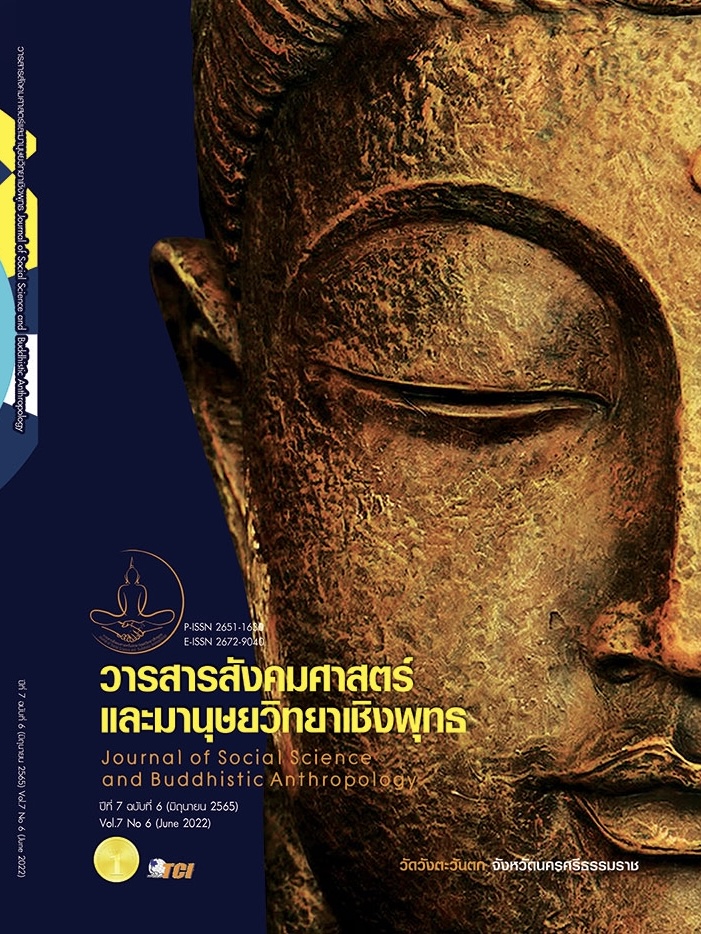THE POLITICS OF THE TRANSFER OF MISSIONS OF THE DEVELOPMENT OF RURAL ROADS TO LOCAL GOVERNMENT ORGANIZATION
Keywords:
Local Government Organization, Mission Transfer, Local Highways, Rural RoadsAbstract
The Objectives of this research article were to: 1) political developments affecting the mission transfer policy of the department of rural roads 2) the role and relationship of politicians, government officials, business groups, and local government organizations that have conflicts of interest to support each other in the transfer. Transfer of missions of the department of rural roads 3) Roles, powers, and duties of the department of rural roads in the case of mission transfers in the event of having to terminate under Section 54 as required by law and 4) Problems, obstacles, and recommendations for the transfer of missions of the Department of Rural Roads. This research is qualitative research. Data were collected from documents, and In-depth interviews with 16 key informants were purposive random sampling. Analyzing descriptive data, the study results revealed that, The development of mission transfer was delayed due to current problems. Political flows and policy flow under the constitution and the act determining plans and procedures for decentralization of power to local government organizations, B.E. Thinkers make suggestions but don't have the power to drive them. As for the political base of the business group, it is the stakeholders who come to use the area of the local government to create bargaining power under the relationship of different groups of people. According to Section 54, there is still unclear duplication of authority. The limitations of the bureaucratic mechanism affect the efficiency and independence in solving road safety problems. The participation of network partners must be created by a central figure. Coordinate region local practice.
References
โกวิท พวงงาม . (2546). การปกครองท้องถิ่นไทย. กรุงเทพมหานคร: วิญญูชน.
เจ้าหน้าที่ของรัฐ 1. (5 พฤศจิกายน 2563). การเมืองของการถ่ายโอนภารกิจของกรมทางหลวงชนบทให้แก่องค์กรปกครองส่วนท้องถิ่น. (บุญเรือง เตชะวิวัฒน์กุล, ผู้สัมภาษณ์)
ตระกูล มีชัย. (2559). การปฏิรูปประเทศด้านการกระจายอำนาจการจัดการบริการสาธารณะขององค์กรปกครองส่วนท้องถิ่น. กรุงเทพมหานคร: สถาบันพระปกเกล้า.
ทรงชัย ทองปาน. (2553). การสังเคราะห์งานวิจัยทางภูมิศาสตร์เพื่อการวางแผนพัฒนางานวิจัย. ปทุมธานี: โรงพิมพ์มหาวิทยาลัยธรรมศาสตร์.
ธเนศวร์ เจริญเมือง. (2540). 100 ปี การปกครองท้องถิ่นไทย พ.ศ. 2440 - 2540. (พิมพ์ครั้งที่ 5). กรุงเทพมหานคร: คบไฟ.
ผู้ประกอบธุรกิจรับเหมาก่อสร้างงานถนน 2. (5 พฤศจิกายน 2563). การเมืองของการถ่ายโอนภารกิจของกรมทางหลวงชนบทให้แก่องค์กรปกครองส่วนท้องถิ่น. (บุญเรือง เตชะวิวัฒน์กุล, ผู้สัมภาษณ์)
วีระศักดิ์ เครือเทพ และคณะ. (2558). 15 ปี การกระจายอำนาจของไทย. กรุงเทพมหานคร: จุฬาลงกรณ์มหาวิทยาลัย.
วุฒิสาร ตันไชย. (2557). การกระจายอำนาจและประชาธิปไตยในประเทศไทย. กรุงเทพมหานคร: สถาบันพระปกเกล้า.
ศุภสวัสดิ์ ชัชวาลย์. (2552). พลวัตการกระจายอำนาจในประเทศไทย. กรุงเทพมหานคร: สถาบันพระปกเกล้า.
สำนักงานคณะกรรมการการกระจายอำนาจให้แก่องค์กรปกครองส่วน. (2549). รูปแบบการดำเนินการเพื่อถ่ายโอนภารกิจให้แก่องค์กรปกครอง ส่วนท้องถิ่น ในระดับพื้นที่พิษณุโลก. พิษณุโลก : มหาวิทยาลัยนเรศวร.
สุพรรณี เกลื่อนกลาด. (2549). กลุ่มผลประโยชน์กับองค์กรปกครองส่วนท้องถิ่น : กรณีศึกษา 4 เทศบาลนครในภาคตะวันออกเฉียงเหนือ. ใน วิทยานิพนธ์ภาควิชาการปกครอง สาขาวิชาการปกครอง. จุฬาลงกรณ์มหาวิทยาลัย.
อัชกรณ์ วงศ์ปรีดี. (2548). ทศวรรษแห่งการปฏิรูปการณ์ปกครองท้องถิ่นถิ่น. วารสารสถาบันพระปกเกล้า, 3(2), 43-60.
อัชกรณ์ วงศ์ปรีดี. (2555). ปัญหาการคลังท้องถิ่นไทย. วารสารการจัดการภาครัฐและภาคเอกชน, 19(1), 8-10.
Miles, M. B. & Huberman, A. M. (1994). Qualitative data analysis: An expand source book 2nd ed. Thousand Oaks: SAGE Publications.
Downloads
Published
How to Cite
Issue
Section
License
Copyright (c) 2022 Journal of Social Science and Buddhistic Anthropology

This work is licensed under a Creative Commons Attribution-NonCommercial-NoDerivatives 4.0 International License.









